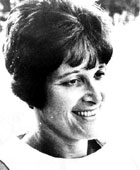Born Maxine Winokur, Kumin attended Radcliffe College (B.A., 1946; M. A, 1948), and has lectured at many universities, including Princeton, Tufts, and Brandeis. She is the author of several collections of poetry, including Up Country (1972), for which she won a Pulitzer Prize, and, most recently, Nurture (1989), Looking for Luck: Poems (1992), and Connecting the Dots: Poems (1996). She has also published several novels, collections of essays and short stories, and more than twenty children's books, several of them in collaboration with the poet Anne Sexton.
Kumin was born in Germantown, Philadelphia, in 1925, attainted a BA and MA from Radcliffe before it was subsumed by Harvard, and now lives with her husband of 55 years in an old farmhouse in central New Hampshire. Here, their three children grown and gone, they have raised ten foals, a succession of dogs and cats, a few sheep, organic vegetables, and for several springs, tended a hundred sugar-maple tree taps.
Both Kumins were avid horseback riders and competed in distance rides, carriage drives, and three-phase events. In July of 1998, Maxine had a near-fatal carriage driving accident, recorded in her memoir, Inside the Halo and Beyond: Anatomy of a Recovery.
The farm, a craggy, heavily forested 200-acre spread, most of which is now in conservation, is the locus of many of her poems and essays. Clearing pastures, building fences, exploring the overgrown trails that wind through the Min Hills, foraging for wild mushrooms, and weeding the beach that fronts on their pond are the physical tasks that free her mind to construct its own paths. "Allegiance to the land is tenderness," she says in one poem.
Kumin is the author of 13 books of poems, five novels, a collection of short stories, four essay collections, and a number of children's books. She has received the Pulitzer Prize in Poetry, the Aiken Taylor Prize, the Poets' Prize, and the Ruth E. Lilly Award.
She served as Consultant in Poetry to the Library of Congress before that post was renamed Poet Laureate of the United States, has taught at Princeton, Columbia, Brandeis and Washington universities and given readings or conducted writers' workshops in every state in the Union, save Hawaii and North Dakota.
Together with Carolyn Kizer, she first served on and then resigned from the board of chancellors of the Academy of American Poets, an act that galvanized the movement for opening this august body to broader representation by women and minorities. |






